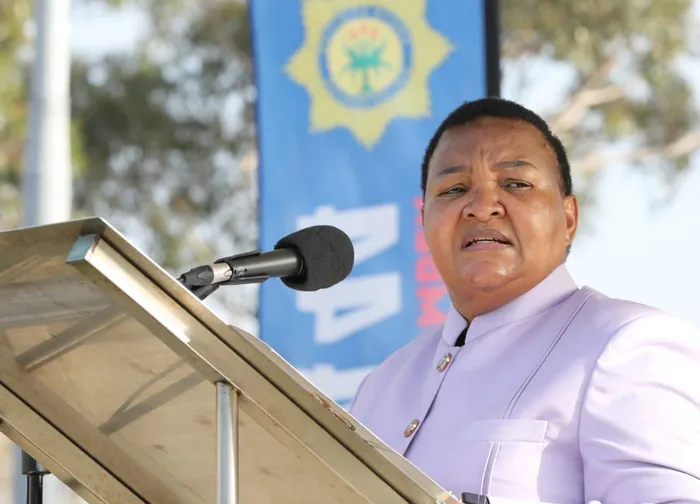Mchunu kept his two deputies powerless, Parly inquiry told

Deputy Minister of Police Polly Boshielo at SAPS Academy Bishop Lavis passing out parade earlier this year.
Image: SAPS
POLICE minister Senzo Mchunu, who is currently on enforced leave, allegedly did not delegate powers to any of his two deputy ministers.
This emerged when Deputy Minister Polly Boshielo testified at the parliamentary inquiry into allegations made by KwaZulu-Natal commissioner Nhlanhla Mkhwanazi.
His colleague, deputy minister Cassel Mathale told the same committee last week that they were not assigned delegated powers ever since they were appointed to their positions last year. Mathale’s testimony brought into the spotlight the question on whether there was a need for deputy ministers.
Boshielo said on Tuesday deputy ministers were appointed in terms of the constitution and were accountable to Parliament on the work they were supposed to do in assisting the minister.
“Although the minister did not delegate to us functions in writing, from time to time we would assist him to do the work. Although the minister did not pen down the delegations, there had been functions we were able to do arising from responsibilities of accounting to Parliament,” she said.
Boshielo said the primary responsibility of deputy ministers was to assist in the development and implementation of policy and to make strategic alignments across the department, based on the scope of roles determined by the minister.
“The role of deputy minister, while constitutionally accountable to Parliament, can be appropriately described as a layer of strategic support without independent executive powers.”
Boshielo said that when Mchunu was suspended, she and Mathale helped then Mineral Resources Minister Gwede Mantashe, initially appointed as acting minister, with the tabling of the SAPS budget in the National Council of Provinces.
She also said when Acting Minister Firoz Cachalia was appointed, they took him through the work of the department and informed him that they were not assigned powers.
“He (Cachalia) then allocated us responsibilities. For now I have been allocated to deal with gender-based violence. He has also delegated the integrated violence prevention strategy.”
Responding to a question from Chief Evidence Leader Advocate Norman Arendse, SC, Boshielo confirmed that the approaches of Mchunu and Cachalia were different. She ascribed that to “different human beings, will have different leadership styles”.
Earlier, Ad Hoc Committee chairperson Soviet Lekganyane declared knowing Boshielo at the start of the public hearing.
“She comes from Limpopo. I served with her in the provincial executive committee of the SACP in the province. I also served with her in the provincial executive committee of the ANC. I was the provincial secretary of the SACP and the ANC,” Lekganyane said.
The Ad Hoc Committee is investigating the allegations involving parts of the criminal justice system that were made by Mkhwanazi at a press briefing on July 6.
The investigation covers the alleged unlawful disbandment of the Political Killings Task Team, the moratorium on filling of vacancies in the Crime Intelligence unit and alleged corrupt relationships between senior leadership of SAPS and criminal gangs as well as political interference in the work of the police service.
Mchunu had issued a directive to National Commissioner Fannie Masemola on December 31, 2024, to disband the PKTT with immediate effect and the freezing of vacant positions at Crime Intelligence.
Cape Times